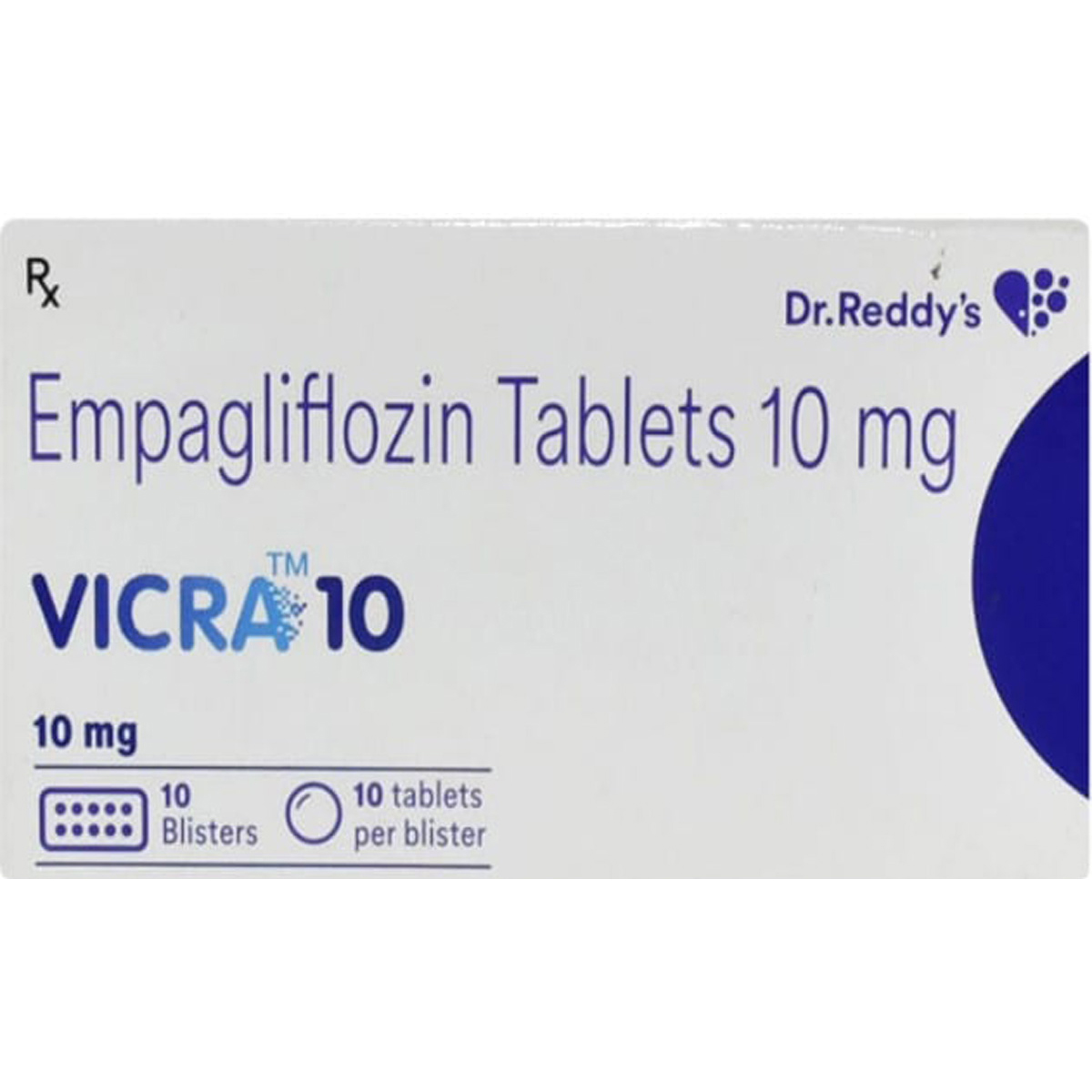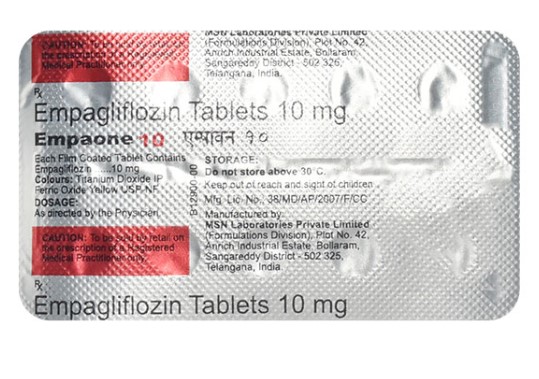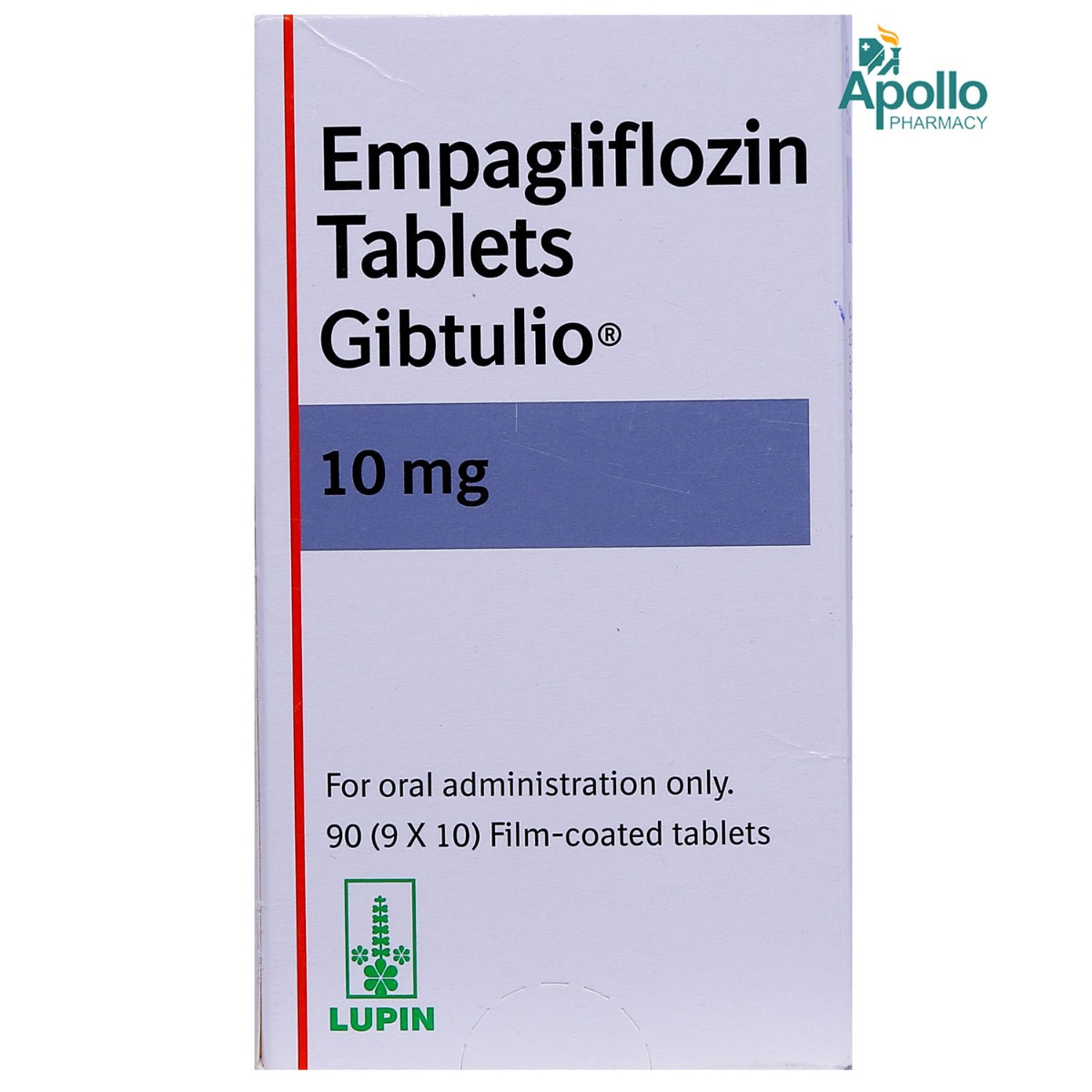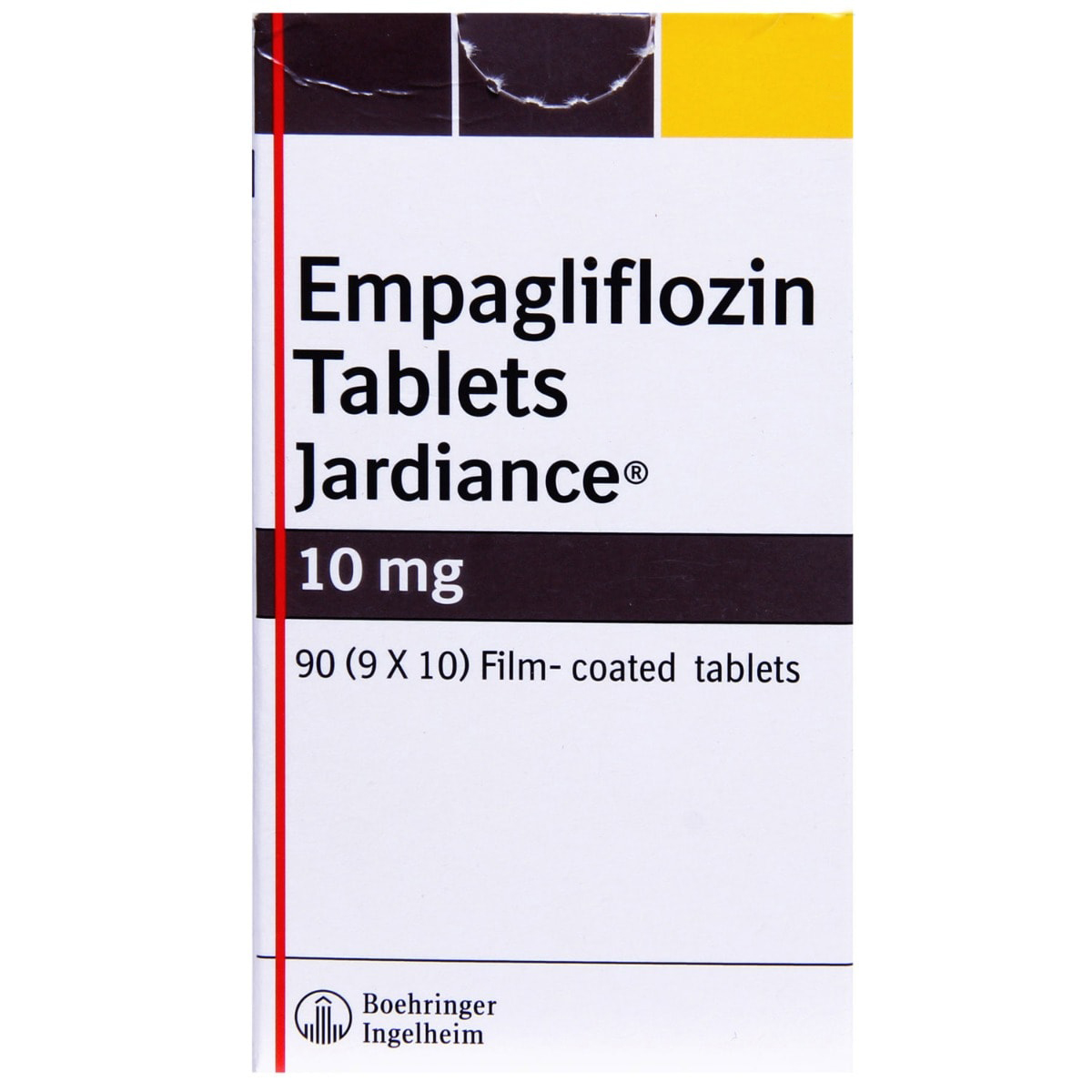Empaglyde 10 Tablet 10's


MRP ₹51.5
(Inclusive of all Taxes)
₹7.7 Cashback (15%)
know your delivery time
Provide Delivery Location
Composition :
Manufacturer/Marketer :
Consume Type :
Return Policy :

Secure Payment

Trusted by 8 Crore Indians

Genuine Products
Therapeutic Class
Country of origin
Manufacturer/Marketer address
Author Details
We provide you with authentic, trustworthy and relevant information
FAQs
Empaglyde 10 Tablet 10's contains empagliflozin, which blocks the sodium-glucose co-transporter-2 (SGLT-2) enzyme in the kidney's proximal tubules. It lowers renal reabsorption of glucose and increases urine excretion of glucose via inhibiting SGLT2. As a result, it lowers blood sugar levels in diabetics.
Yes, Empaglyde 10 Tablet 10's can cause a minor upset of the stomach. However, do not stop taking it. Discuss with your doctor in case of severe stomach upset.
If you feel thirsty after taking Empaglyde 10 Tablet 10's, it may be because of dehydration as Empaglyde 10 Tablet 10's can lead to loss of fluids. Increase intake of fluids, if even then you feel thirsty please consult your doctor.
If you have symptoms like increased hunger, increased thirst, frequent urination (usually at night), unexplained weight loss, fatigue, blurred vision, slow wound/sores healing, and frequent infections, contact doctor as it can be a condition of type 2 diabetes.
In case you feel that your blood sugar level is going down and you are feeling weak, immediately eat sugar candies or drink sugary beverages. It will help to balance the blood sugar levels in your body. So, it is advisable to keep sugar candies with you.
Lactic acidosis is a rare but life-threatening condition when there is too much lactic acid build up in the bloodstream. Long term intake of Empaglyde 10 Tablet 10's may lead to lactic acidosis when cells get deprived of oxygen levels. Symptoms of lactic acidosis include the burning sensation of the muscle, muscle ache, fast breathing, nausea, and stomach pain. Immediately contact the doctor about this complication.
Empaglyde 10 Tablet 10's should be avoided in patients who are allergic to any of the components or excipients of this medicine. It should be avoided in patients suffering from moderate to severe kidney disease or liver disease. It is also not advised to use this drug if you drink too much alcohol. Make sure to inform your health care professional if you are pregnant or breastfeeding.
If you have been affected by diabetes, you should have a test of HbA1c once in three months.
No. Till date there is no clinical evidence that states that Empaglyde 10 Tablet 10's affects fertility in either men or women.
Hypoglycaemia refers to low blood sugar levels. The symptoms of hypoglycaemia include nausea, headache, irritability, hunger, sweating, dizziness.
No. Empaglyde 10 Tablet 10's is only prescribed for treating type 2 diabetes, also called 'non-insulin-dependent diabetes.
Disclaimer
Alcohol
Safe if prescribed
It is advisable not to consume alcohol along with Empaglyde 10 Tablet 10's to avoid unpleasant side effects like lactic acidosis.
Pregnancy
Consult your doctor
Empaglyde 10 Tablet 10's is not recommended during pregnancy. However, your doctor may prescribe it for you during pregnancy if he/she feels the benefit outweighs the risk. You should not take Empaglyde 10 Tablet 10's without a doctor's advice.
Breast Feeding
Consult your doctor
Empaglyde 10 Tablet 10's is not recommended if you are breastfeeding or if you are planning to breastfeed your baby.
Driving
Safe if prescribed
Empaglyde 10 Tablet 10's should not affect your ability to drive or operate machinery/tools.
Liver
Consult your doctor
Empaglyde 10 Tablet 10's to be taken with caution, especially if you have a history of liver diseases/conditions. The dose may have to be adjusted by your doctor.
Kidney
Consult your doctor
Empaglyde 10 Tablet 10's to be taken with caution, especially if you have a history of Kidney diseases/conditions. The dose may have to be adjusted by your doctor depending on your renal functions. Empaglyde 10 Tablet 10's is not recommended in severe kidney disease. Regular monitoring of kidney function tests is therefore important if you're taking Empaglyde 10 Tablet 10's.
Children
Safe if prescribed
Empaglyde 10 Tablet 10's is not recommended for children below ten years of age. The dose is to be adjusted and recommended by a child specialist only for children over ten years.
Product Substitutes
About Empaglyde 10 Tablet 10's
Empaglyde 10 Tablet 10's belongs to a group of antidiabetic medicines (sodium-glucose co-transporter-2 (SGLT2) inhibitors). Empaglyde 10 Tablet 10's is prescribed for the condition of type 2 diabetes when diet and exercise alone cannot control their blood sugar levels. Type 2 diabetes is a condition where the body does not make enough insulin, or the insulin that it makes does not work properly.
Empaglyde 10 Tablet 10's contains empagliflozin, which works by blocking the sodium-glucose co-transporter-2 (SGLT-2) enzyme in the kidney's proximal tubules. It lowers renal reabsorption of glucose and increases urine excretion of glucose via inhibiting SGLT2. As a result, it lowers blood sugar levels in diabetics.
Take Empaglyde 10 Tablet 10's as prescribed. You are advised to take Empaglyde 10 Tablet 10's for as long as your doctor has prescribed it for you, depending on your medical condition. In some cases, you may experience certain common side effects such as thrush, pain or a burning feeling when you pee, peeing more than normal, and mild skin rash or itchy skin. Most of these side effects do not require medical attention and will resolve gradually over time. However, you are advised to consult your doctor if you experience these side effects persistently.
Do not consume Empaglyde 10 Tablet 10's if you are allergic to any component present in Empaglyde 10 Tablet 10's. If you are pregnant or breastfeeding, consult your doctor before taking Empaglyde 10 Tablet 10's. Avoid drinking alcohol while taking Empaglyde 10 Tablet 10's since it may produce unpleasant side effects. There is limited information available about the use of Empaglyde 10 Tablet 10's in children, therefore, it is not recommended to use in children. Inform your doctor about all of the medications you are taking as well as your medical history to rule out any undesirable side effects or interactions.
Uses of Empaglyde 10 Tablet 10's
Medicinal Benefits Mweb
Key Benefits
Empaglyde 10 Tablet 10's plays a vital role in managing diabetes and achieving good control of blood sugar levels by delaying the absorption of sugar and increasing insulin sensitivity in the body. Empaglyde 10 Tablet 10's does not cause a sudden lowering of the blood glucose level or cause significant hypoglycaemia. In the prediabetic condition, Empaglyde 10 Tablet 10's is the only recommended treatment available. Empaglyde 10 Tablet 10's also helps to prevent serious complications of diabetes such as kidney damage (Diabetic Nephropathy), blindness (Diabetic Retinopathy), loss of sensation in your hands and feet (Diabetic Neuropathy) or even loss of foot! Empaglyde 10 Tablet 10's also helps to reduce your chance of having a heart attack or stroke.
Directions for Use
Side Effects of Empaglyde 10 Tablet 10's
- Thrush (fungal infection)
- Pain or a burning feeling when you pee
- Peeing more than normal
- Mild skin rash or itchy skin
Drug Warnings
If you are allergic to any of the ingredients in Empaglyde 10 Tablet 10's, do not consume it. If you suffer heart abnormalities, diabetic ketoacidosis, skin problems, acute pancreatitis, low blood sugar levels, or kidney or liver problems, notify your doctor. If you are pregnant or breastfeeding, consult your doctor before taking Empaglyde 10 Tablet 10's. Avoid drinking alcohol while taking Empaglyde 10 Tablet 10's since it may produce unpleasant side effects. Inform your doctor about all the medications you are taking and your medical history to rule out any unwanted side effects.
Drug-Drug Interactions Checker List
- HYDROCHLOROTHIAZIDE
- AMLODIPINE
- FUROSEMIDE
- DIGOXIN
- METOPROLOL
- PREDNISOLONE
- GATIFLOXACIN
Habit Forming
Special Advise
- Keep taking Empaglyde 10 Tablet 10's even if you think your blood sugar levels are under control. If you miss a dose, do not take a larger dose; consult your treating physician for advice.
- Take short, frequent meals, and avoid prolonged fasting when taking Empaglyde 10 Tablet 10's. Beware of symptoms of hypoglycaemia (low blood sugar) which include sweating, dizziness, palpitations, shivering, intense thirst, dry mouth, dry skin, frequent urination etc. Whenever you experience any of the symptoms mentioned above, immediately consume 5-6 candies, three glucose biscuits, or three teaspoons of honey/sugar and get in touch with your physician. Make sure to carry these with you at all times, especially during long travels.
Diet & Lifestyle Advise
- Include foods rich in healthy carbohydrates and fibre, fruits, whole grains, and vegetables in your diet.
- Try eating food at regular intervals. Do not skip meals. Also, try not to overeat.
- Follow a healthy diet and walk for at least 45minutes to complement treatment with Empaglyde 10 Tablet 10's.
- Maintain a healthy weight by exercising regularly.
- Rest properly, and avoid stress by doing meditation or yoga.
All Substitutes & Brand Comparisons
RX
Out of StockEmpagreat 10 Tablet 10's
Mankind Pharma Pvt Ltd
₹51.5
(₹5.15 per unit)
RX
Out of StockEmpacip 10 Tablet 10's
Cipla Ltd
₹84
(₹8.4 per unit)
63% COSTLIERRX
Out of StockEmpasov 10 Tablet 10's
Cipla Ltd
₹84
(₹8.4 per unit)
63% COSTLIER

Have a query?











